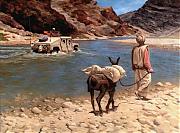Americans have heard it repeatedly since September 11: The acts of terrorism inflicted on our shore were the murderous consequences of an ongoing struggle within Islam. At its most dramatic extremes, that conflict pits radical jihadists against moderate Muslims. But a quieter front in the struggle is probably of greater import. It involves the millions of Muslims who are being wooed by the proselytizers of a puritanical, and often highly politicized, strain of the faith. This volatile blend of Saudi Wahhabi Islam and political Islam-dubbed Islamism by one of its early-20th-century founders-is the assembly line of future jihadists, some experts hold, and its agents are busy indoctrinating young Muslims from Lahore to Los Angeles.
The outcome of this clash will bear directly on the course of the war on terrorism by answering the most fundamental question: Is mainstream Islam compatible with democracy and basic rights and freedoms established by international law?
While the stakes of this struggle are enormously high, American and European efforts to make sense of it have so far proved to be inadequate. A new Rand report, only the most recent such critique, charges that the U.S. government-almost six years after 9/11-still lacks a "consistent view on who the moderates are, where the opportunities for building networks among them lie, and how best to build the networks."...







Bookmarks